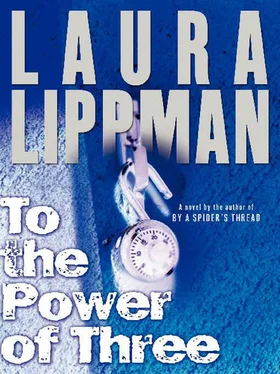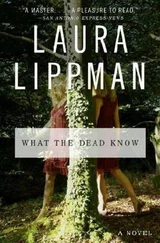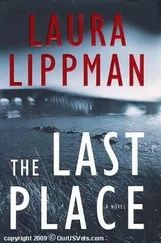“Hey, just because she was your student doesn’t mean you could have seen it coming.”
The stage had been set with chairs, and Giff began loading them onto a wheeled cart.
“I’m not being melodramatic.” Giff allowed himself a half smile at his choice of words. “Perri was very angry with me over something that happened last fall. She and a few other students persuaded me to stage Anyone Can Whistle as our fall musical. I cast her and Kat in the leads, and we started rehearsing.”
“That’s pretty cool, actually. Doing a show like that at the high-school level.”
“Well, it’s dated, and the problems in the book have never been resolved, but it feels powerful and sophisticated to high-school students. And the chorus is huge, just utterly expandable, which is always a good thing for us.”
“So what was Perri’s beef, if she got the play she wanted and the part she wanted?”
“Three weeks in, we had to give up on Anyone Can Whistle and sub in Oklahoma ! There were some complications with the rights-turns out that Everyman wanted to do it. You know an Equity company within a certain-mile radius had bumping rights. To be fair, I told the leads they could have comparable parts-Kat as Laurey, Perri as Ado Annie.”
“Most girls would kill to be Ado Annie.” Peter regretted the wording, but Old Giff didn’t seem to notice.
“That’s what I thought. But Perri wanted no part of it. She accused me of selling out, of bowing to pressure from Kat’s father, so his daughter could have a bigger part.”
“Crazy.” The word echoed a little in the empty auditorium, and Peter realized he had sounded insensitive.
“Well, between us, a lot of parents were upset, once they began reading the script. The Everyman Theater gave me a graceful way out of a tight spot. The mental institution! I mean, half the kids in this place are on Prozac or Wellbutrin. It’s a kind of sensitive topic. And when Hartigan read the lyrics to his daughter’s little seduction number, ‘Come Play Wiz Me’-well, the guy was on the phone trying to rewrite Stephen Sondheim. And my Hapgood was no good. Now, you-you would have been extraordinary in the role. Sexy and a good singer.”
While Peter had come here in hopes that his old drama teacher would gush over him, this was more affection than he had bargained for.
“Do you honestly think choosing Oklahoma ! over Anyone Can Whistle is a reason to shoot somebody?”
Giff rubbed his cheeks, massaging them in circles, forward and back. “People have killed over the cheerleading squad, why not the school musical? But-no, no, I don’t think this is a case of cause and effect. Perri may have had some resentment of Kat. You know I always saw my classes as-”
“A repertory company, like the Old Abbey,” Peter finished. It was one of Old Giff’s more repeated riffs, and Giff repeated a lot of his riffs. Yet Peter had never been relegated to spear-carrying. He had been too good to waste on the chorus, for even a single production.
“Yes, exactly. And Perri had played by the rules, taking parts large and small, doing a lot of behind-the-scenes work. The year after she was the lead in The Lark, she did chorus in Brigadoon with no complaint. It was one thing to cancel Whistle -I think even Perri knew it was a stretch-but to see Kat, who had never auditioned for a school play, waltz in and end up with a plum lead in a show that her father had lobbied for…well, I’m sure it stuck in Perri’s craw. She didn’t even try out for the spring play this year- Our Town, which I chose because I thought she would be a wonderful Emily. She was mad at me. She was mad at everyone, it seemed, this past year.”
“Well, that explains it, doesn’t it?” Peter didn’t see how he could ever lead the conversation back to himself now, not in a graceful way.
“Maybe,” Giff said, rubbing his cheeks again. “Maybe. You know what you should do?”
“What?”
“You should speak-or sing, yes, sing-at today’s assembly. We should pick an appropriate song. For Kat.”
“I don’t know…” Peter was thinking of the songs he had sung to Kat three years ago, made-up songs that he would be mortified to re-create for anyone, ever.
“Not a show tune, just something sweet and simple. A hymn-well, not a hymn -hymn, someone would complain, and it would be so Madalyn Murray O’Hair all over again. But you should sing. Or speak.”
“I don’t think so, Giff.”
“Oh, you must. You must, Peter. For me. For Kat.”
And so it happenedthat Peter Lasko stood before the assembled student body of Glendale High School after a series of presentations-by the principal, by the county executive, by a pretty young guidance counselor who encouraged students to come talk to her about anything, absolutely anything, with the promise of absolute confidentiality.
Like any actor worth a damn, he had stage fright, but he’d never had it in such overwhelming proportions before. Willing his legs not to shake, Peter clasped his arms across his chest and leaned into the mike, singing the song that Giff, the principal, and the guidance counselor had finally agreed was appropriate: “You’ll Never Walk Alone.” It was, ironically, a show tune and a hymn. Peter sang in a clear, unaffected tenor, although it is doubtful that anyone heard the final, powerful build, for the girls in the auditorium began to cry so hard and so lustily that they drowned him out, almost as if he were starring in Bye Bye Birdie . Suffer indeed.
Peter, who had been Billy Bigelow in Carousel, realized he’d never had a chance to sing this particular song before, given that it’s first performed over Billy’s dead body. And in the reprise, at the play’s end, Bill just stands to the side, a ghost, praying for his daughter to hear the choir’s words and heed them, to know that she is loved, that he would always be there for her even if he was dead.
The last note, while not the highest, was a bitch, even transposed to a friendlier key for his tenor range, but Peter nailed it. You’ll never walk alone. You’ll never walk A-LOOOOOOOOOOOOOOOOONE.
He absolutely nailed it, not that anyone heard.
The Kahns were adamantthat they did not want to speak to the police in Perri’s room, but neither did they want to leave her for even a few minutes. Middle-class people, used to having rights, they assumed this ended the discussion. They couldn’t leave their daughter, they didn’t want to be interviewed in front of their daughter, so the police would have to come back later.
But they were also reasonable people, and when it was explained that the conversation could not be postponed, they agreed to take turns, meeting with Lenhardt and Infante in the hospital’s food court one at a time. Lenhardt allowed them to think he was accommodating them, but it was what he had wanted all along, getting each parent alone. He was surprised they didn’t insist on calling their high-priced lawyer, but it probably didn’t occur to them that they needed legal advice. Good.
First came the father, Zachary Kahn, although his wife called him Zip. Lenhardt began by asking about that, a way of settling in, as if he were making small talk with the father of one of Jessica’s or Jason’s friends.
“An old nickname,” the man explained, grasping his cup of black coffee in two hands as if it were a winter day and he was trying to warm himself. “I gave it to myself, in my twenties. I wanted a nickname, and I liked that comic Zippy the Pinhead, so I anointed myself Zip. Twenty years later I’m still Zip. The follies of youth.”
Читать дальше












